Comprehensive Report on Conceptual Framework of Financial Reporting
VerifiedAdded on 2020/02/03
|6
|1355
|127
Report
AI Summary
This report provides a comprehensive analysis of the conceptual framework for financial reporting. It begins by explaining the purpose of the framework, which aids in preparing reliable and accurate financial statements and supports the development of the International Financial Reporting Standards (IFRS). The report then identifies the needs of various stakeholders, including customers, government, employees, and investors, emphasizing how financial information influences their decisions. Furthermore, it differentiates between financial accounting, which focuses on preparing financial statements for external users, and management accounting, which provides information for internal decision-making. The report concludes by summarizing the key findings and emphasizing the importance of the conceptual framework in financial reporting.

Paraphrase This Document
Need a fresh take? Get an instant paraphrase of this document with our AI Paraphraser
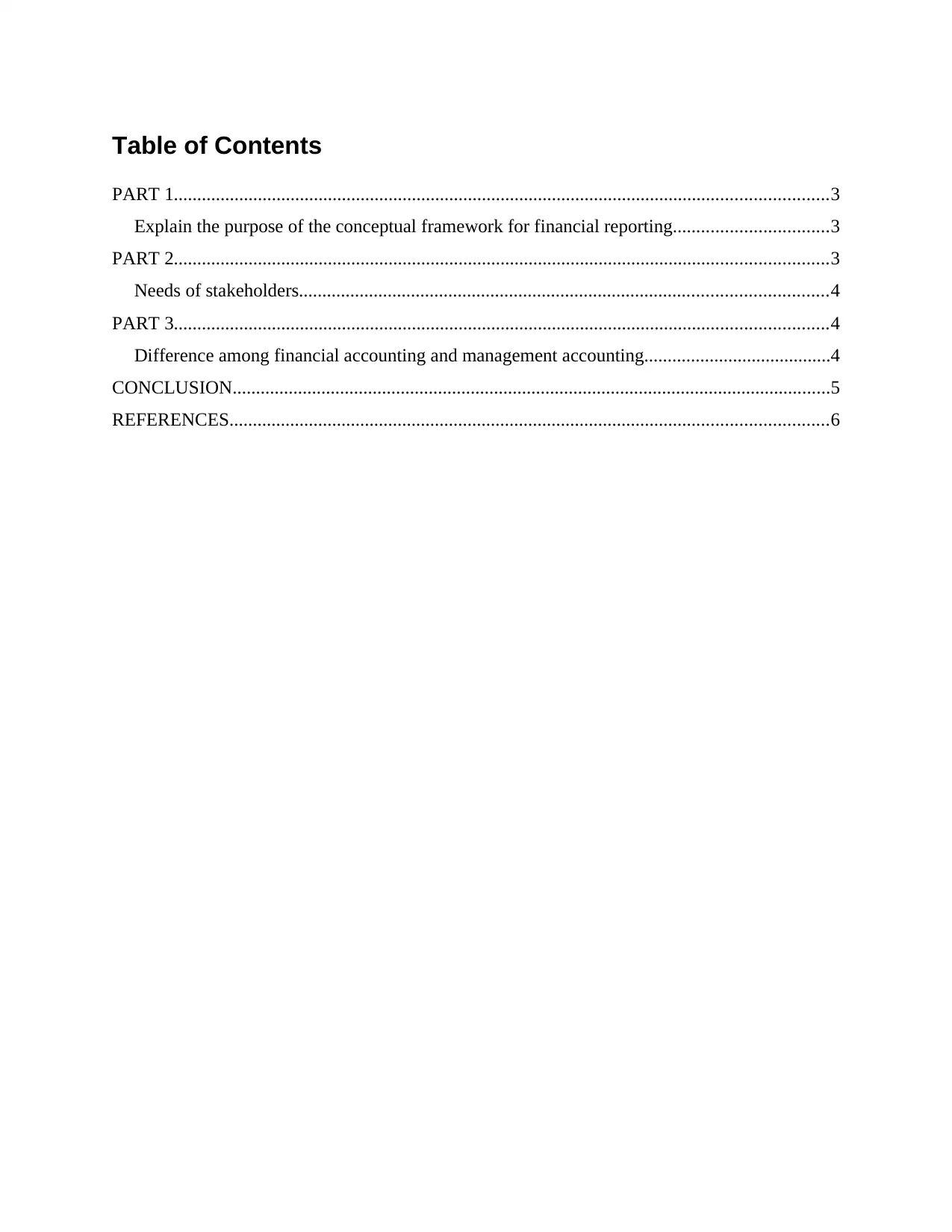
Table of Contents
PART 1............................................................................................................................................3
Explain the purpose of the conceptual framework for financial reporting.................................3
PART 2............................................................................................................................................3
Needs of stakeholders.................................................................................................................4
PART 3............................................................................................................................................4
Difference among financial accounting and management accounting........................................4
CONCLUSION................................................................................................................................5
REFERENCES................................................................................................................................6
PART 1............................................................................................................................................3
Explain the purpose of the conceptual framework for financial reporting.................................3
PART 2............................................................................................................................................3
Needs of stakeholders.................................................................................................................4
PART 3............................................................................................................................................4
Difference among financial accounting and management accounting........................................4
CONCLUSION................................................................................................................................5
REFERENCES................................................................................................................................6
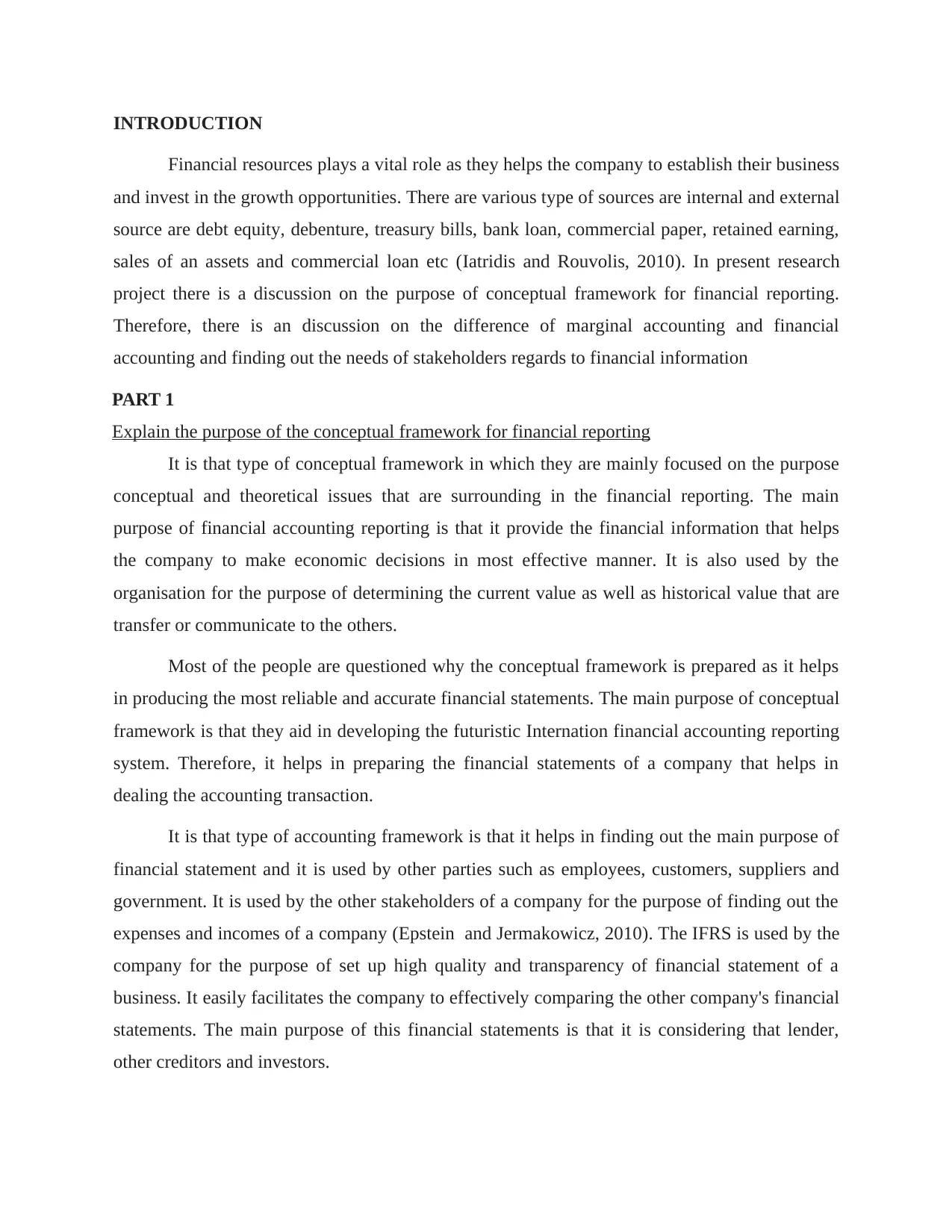
INTRODUCTION
Financial resources plays a vital role as they helps the company to establish their business
and invest in the growth opportunities. There are various type of sources are internal and external
source are debt equity, debenture, treasury bills, bank loan, commercial paper, retained earning,
sales of an assets and commercial loan etc (Iatridis and Rouvolis, 2010). In present research
project there is a discussion on the purpose of conceptual framework for financial reporting.
Therefore, there is an discussion on the difference of marginal accounting and financial
accounting and finding out the needs of stakeholders regards to financial information
PART 1
Explain the purpose of the conceptual framework for financial reporting
It is that type of conceptual framework in which they are mainly focused on the purpose
conceptual and theoretical issues that are surrounding in the financial reporting. The main
purpose of financial accounting reporting is that it provide the financial information that helps
the company to make economic decisions in most effective manner. It is also used by the
organisation for the purpose of determining the current value as well as historical value that are
transfer or communicate to the others.
Most of the people are questioned why the conceptual framework is prepared as it helps
in producing the most reliable and accurate financial statements. The main purpose of conceptual
framework is that they aid in developing the futuristic Internation financial accounting reporting
system. Therefore, it helps in preparing the financial statements of a company that helps in
dealing the accounting transaction.
It is that type of accounting framework is that it helps in finding out the main purpose of
financial statement and it is used by other parties such as employees, customers, suppliers and
government. It is used by the other stakeholders of a company for the purpose of finding out the
expenses and incomes of a company (Epstein and Jermakowicz, 2010). The IFRS is used by the
company for the purpose of set up high quality and transparency of financial statement of a
business. It easily facilitates the company to effectively comparing the other company's financial
statements. The main purpose of this financial statements is that it is considering that lender,
other creditors and investors.
Financial resources plays a vital role as they helps the company to establish their business
and invest in the growth opportunities. There are various type of sources are internal and external
source are debt equity, debenture, treasury bills, bank loan, commercial paper, retained earning,
sales of an assets and commercial loan etc (Iatridis and Rouvolis, 2010). In present research
project there is a discussion on the purpose of conceptual framework for financial reporting.
Therefore, there is an discussion on the difference of marginal accounting and financial
accounting and finding out the needs of stakeholders regards to financial information
PART 1
Explain the purpose of the conceptual framework for financial reporting
It is that type of conceptual framework in which they are mainly focused on the purpose
conceptual and theoretical issues that are surrounding in the financial reporting. The main
purpose of financial accounting reporting is that it provide the financial information that helps
the company to make economic decisions in most effective manner. It is also used by the
organisation for the purpose of determining the current value as well as historical value that are
transfer or communicate to the others.
Most of the people are questioned why the conceptual framework is prepared as it helps
in producing the most reliable and accurate financial statements. The main purpose of conceptual
framework is that they aid in developing the futuristic Internation financial accounting reporting
system. Therefore, it helps in preparing the financial statements of a company that helps in
dealing the accounting transaction.
It is that type of accounting framework is that it helps in finding out the main purpose of
financial statement and it is used by other parties such as employees, customers, suppliers and
government. It is used by the other stakeholders of a company for the purpose of finding out the
expenses and incomes of a company (Epstein and Jermakowicz, 2010). The IFRS is used by the
company for the purpose of set up high quality and transparency of financial statement of a
business. It easily facilitates the company to effectively comparing the other company's financial
statements. The main purpose of this financial statements is that it is considering that lender,
other creditors and investors.
⊘ This is a preview!⊘
Do you want full access?
Subscribe today to unlock all pages.

Trusted by 1+ million students worldwide
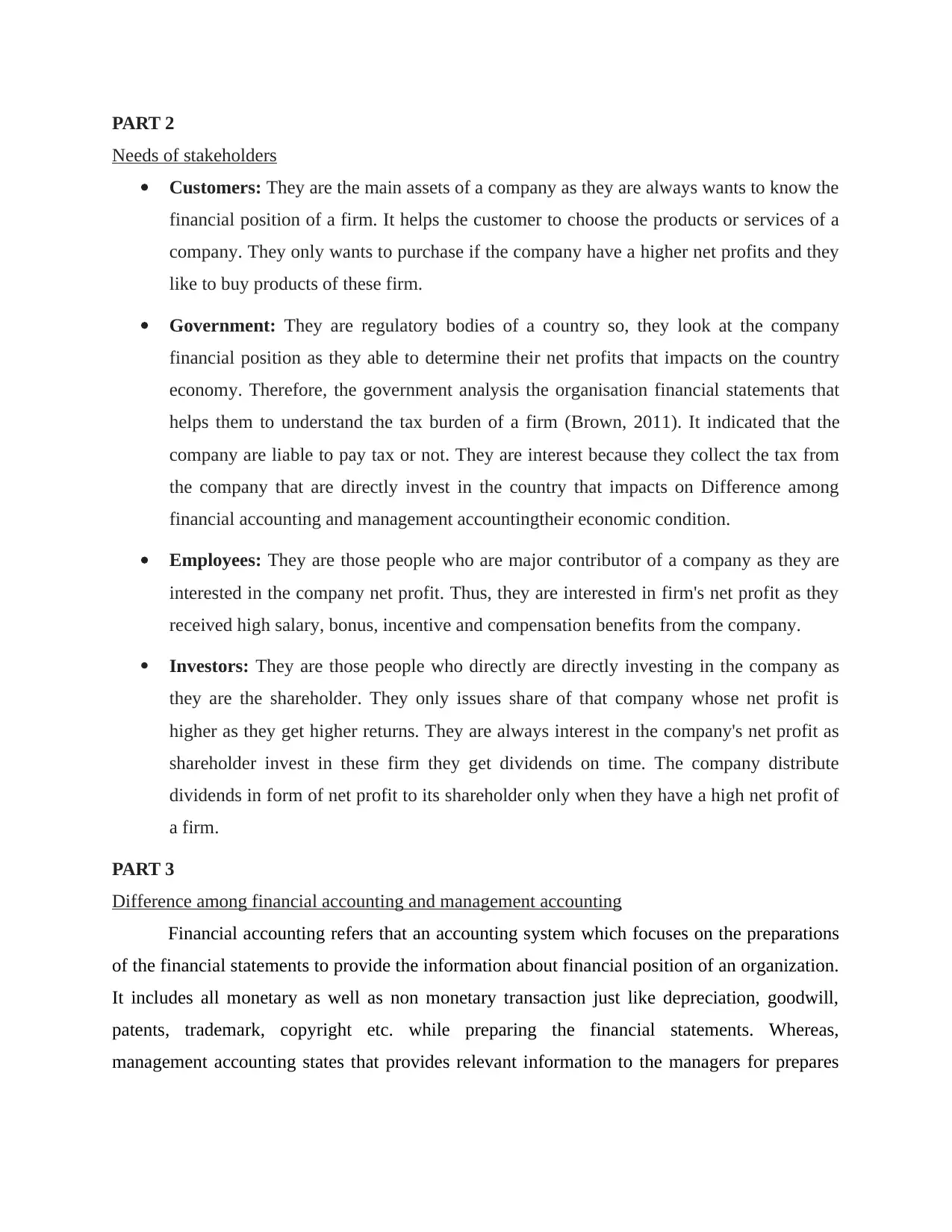
PART 2
Needs of stakeholders
Customers: They are the main assets of a company as they are always wants to know the
financial position of a firm. It helps the customer to choose the products or services of a
company. They only wants to purchase if the company have a higher net profits and they
like to buy products of these firm.
Government: They are regulatory bodies of a country so, they look at the company
financial position as they able to determine their net profits that impacts on the country
economy. Therefore, the government analysis the organisation financial statements that
helps them to understand the tax burden of a firm (Brown, 2011). It indicated that the
company are liable to pay tax or not. They are interest because they collect the tax from
the company that are directly invest in the country that impacts on Difference among
financial accounting and management accountingtheir economic condition.
Employees: They are those people who are major contributor of a company as they are
interested in the company net profit. Thus, they are interested in firm's net profit as they
received high salary, bonus, incentive and compensation benefits from the company.
Investors: They are those people who directly are directly investing in the company as
they are the shareholder. They only issues share of that company whose net profit is
higher as they get higher returns. They are always interest in the company's net profit as
shareholder invest in these firm they get dividends on time. The company distribute
dividends in form of net profit to its shareholder only when they have a high net profit of
a firm.
PART 3
Difference among financial accounting and management accounting
Financial accounting refers that an accounting system which focuses on the preparations
of the financial statements to provide the information about financial position of an organization.
It includes all monetary as well as non monetary transaction just like depreciation, goodwill,
patents, trademark, copyright etc. while preparing the financial statements. Whereas,
management accounting states that provides relevant information to the managers for prepares
Needs of stakeholders
Customers: They are the main assets of a company as they are always wants to know the
financial position of a firm. It helps the customer to choose the products or services of a
company. They only wants to purchase if the company have a higher net profits and they
like to buy products of these firm.
Government: They are regulatory bodies of a country so, they look at the company
financial position as they able to determine their net profits that impacts on the country
economy. Therefore, the government analysis the organisation financial statements that
helps them to understand the tax burden of a firm (Brown, 2011). It indicated that the
company are liable to pay tax or not. They are interest because they collect the tax from
the company that are directly invest in the country that impacts on Difference among
financial accounting and management accountingtheir economic condition.
Employees: They are those people who are major contributor of a company as they are
interested in the company net profit. Thus, they are interested in firm's net profit as they
received high salary, bonus, incentive and compensation benefits from the company.
Investors: They are those people who directly are directly investing in the company as
they are the shareholder. They only issues share of that company whose net profit is
higher as they get higher returns. They are always interest in the company's net profit as
shareholder invest in these firm they get dividends on time. The company distribute
dividends in form of net profit to its shareholder only when they have a high net profit of
a firm.
PART 3
Difference among financial accounting and management accounting
Financial accounting refers that an accounting system which focuses on the preparations
of the financial statements to provide the information about financial position of an organization.
It includes all monetary as well as non monetary transaction just like depreciation, goodwill,
patents, trademark, copyright etc. while preparing the financial statements. Whereas,
management accounting states that provides relevant information to the managers for prepares
Paraphrase This Document
Need a fresh take? Get an instant paraphrase of this document with our AI Paraphraser
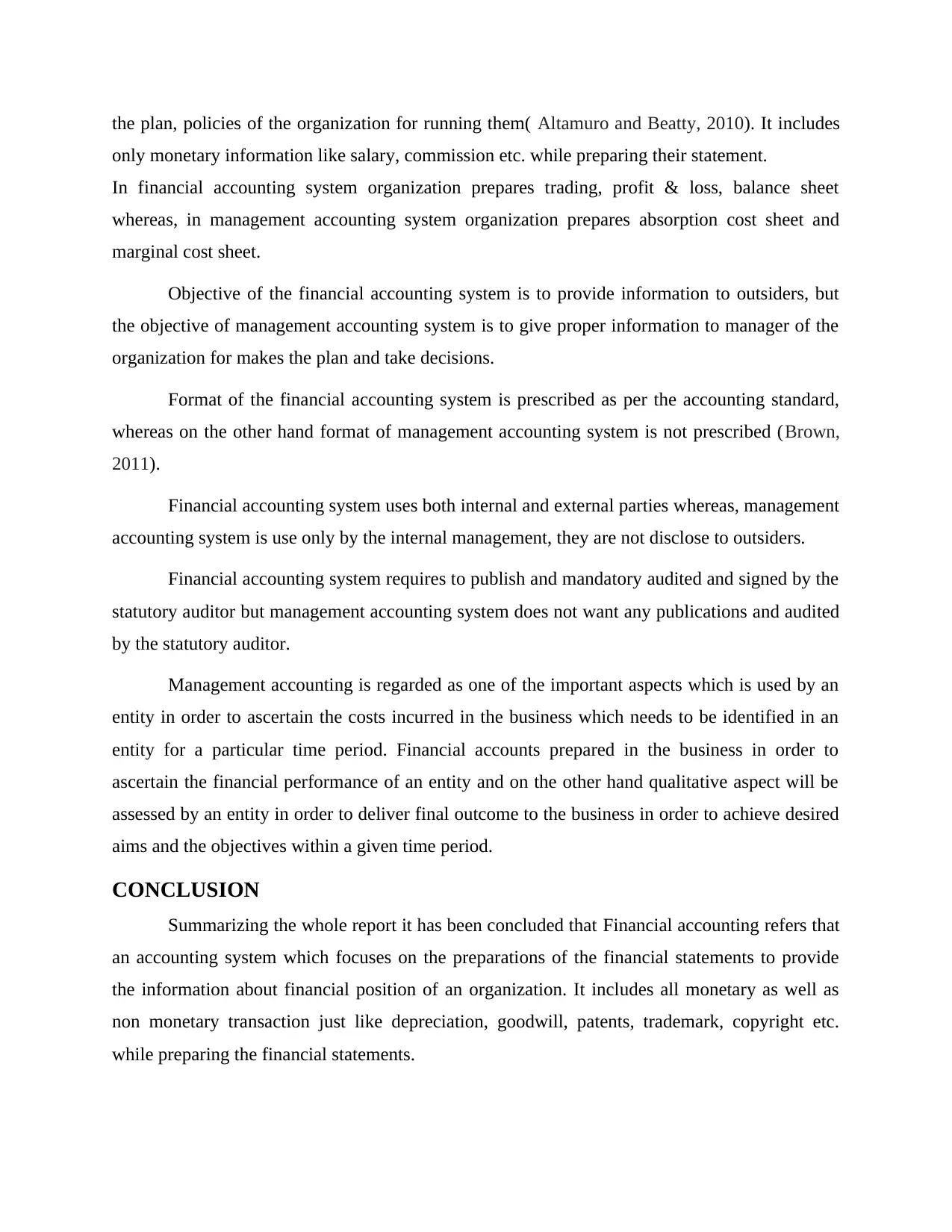
the plan, policies of the organization for running them( Altamuro and Beatty, 2010). It includes
only monetary information like salary, commission etc. while preparing their statement.
In financial accounting system organization prepares trading, profit & loss, balance sheet
whereas, in management accounting system organization prepares absorption cost sheet and
marginal cost sheet.
Objective of the financial accounting system is to provide information to outsiders, but
the objective of management accounting system is to give proper information to manager of the
organization for makes the plan and take decisions.
Format of the financial accounting system is prescribed as per the accounting standard,
whereas on the other hand format of management accounting system is not prescribed (Brown,
2011).
Financial accounting system uses both internal and external parties whereas, management
accounting system is use only by the internal management, they are not disclose to outsiders.
Financial accounting system requires to publish and mandatory audited and signed by the
statutory auditor but management accounting system does not want any publications and audited
by the statutory auditor.
Management accounting is regarded as one of the important aspects which is used by an
entity in order to ascertain the costs incurred in the business which needs to be identified in an
entity for a particular time period. Financial accounts prepared in the business in order to
ascertain the financial performance of an entity and on the other hand qualitative aspect will be
assessed by an entity in order to deliver final outcome to the business in order to achieve desired
aims and the objectives within a given time period.
CONCLUSION
Summarizing the whole report it has been concluded that Financial accounting refers that
an accounting system which focuses on the preparations of the financial statements to provide
the information about financial position of an organization. It includes all monetary as well as
non monetary transaction just like depreciation, goodwill, patents, trademark, copyright etc.
while preparing the financial statements.
only monetary information like salary, commission etc. while preparing their statement.
In financial accounting system organization prepares trading, profit & loss, balance sheet
whereas, in management accounting system organization prepares absorption cost sheet and
marginal cost sheet.
Objective of the financial accounting system is to provide information to outsiders, but
the objective of management accounting system is to give proper information to manager of the
organization for makes the plan and take decisions.
Format of the financial accounting system is prescribed as per the accounting standard,
whereas on the other hand format of management accounting system is not prescribed (Brown,
2011).
Financial accounting system uses both internal and external parties whereas, management
accounting system is use only by the internal management, they are not disclose to outsiders.
Financial accounting system requires to publish and mandatory audited and signed by the
statutory auditor but management accounting system does not want any publications and audited
by the statutory auditor.
Management accounting is regarded as one of the important aspects which is used by an
entity in order to ascertain the costs incurred in the business which needs to be identified in an
entity for a particular time period. Financial accounts prepared in the business in order to
ascertain the financial performance of an entity and on the other hand qualitative aspect will be
assessed by an entity in order to deliver final outcome to the business in order to achieve desired
aims and the objectives within a given time period.
CONCLUSION
Summarizing the whole report it has been concluded that Financial accounting refers that
an accounting system which focuses on the preparations of the financial statements to provide
the information about financial position of an organization. It includes all monetary as well as
non monetary transaction just like depreciation, goodwill, patents, trademark, copyright etc.
while preparing the financial statements.
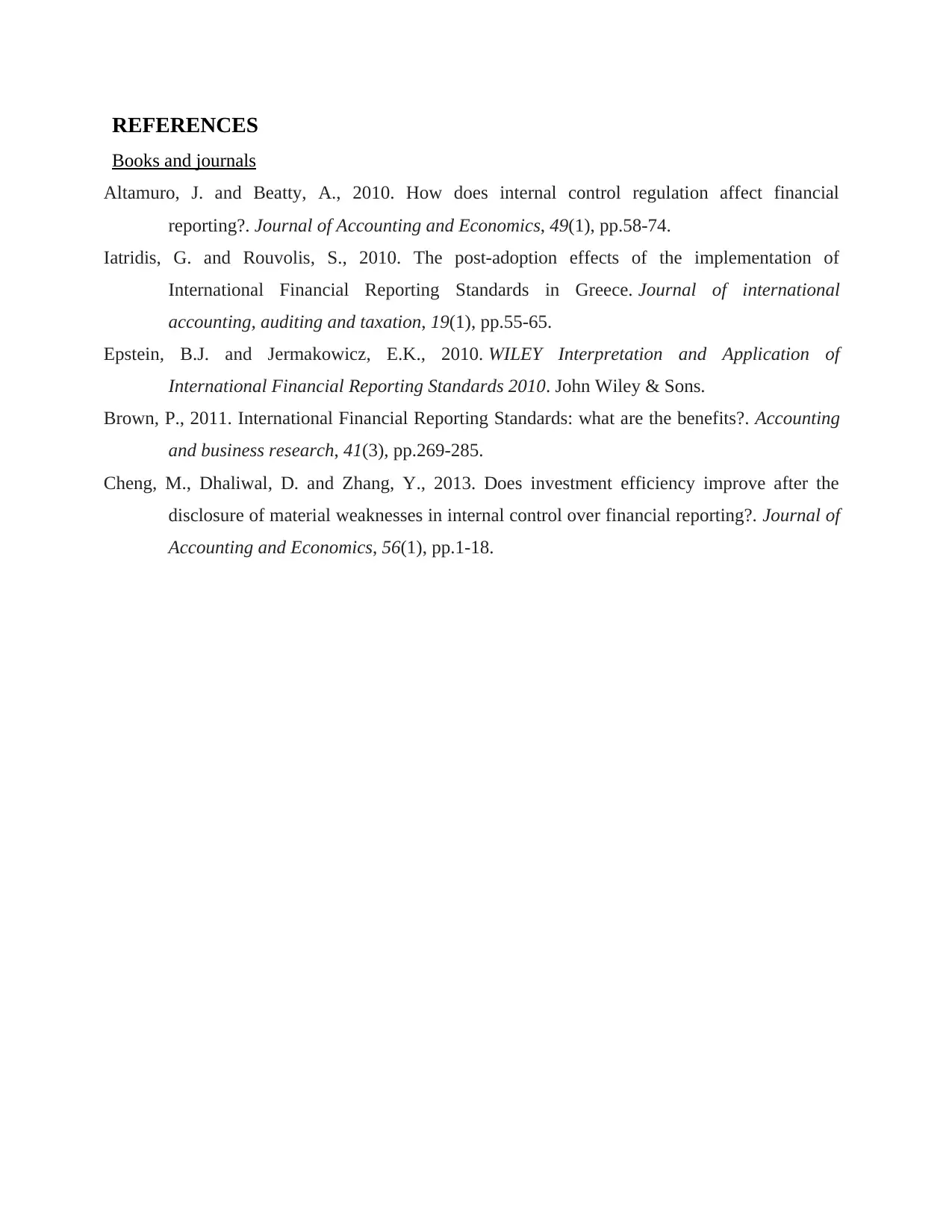
REFERENCES
Books and journals
Altamuro, J. and Beatty, A., 2010. How does internal control regulation affect financial
reporting?. Journal of Accounting and Economics, 49(1), pp.58-74.
Iatridis, G. and Rouvolis, S., 2010. The post-adoption effects of the implementation of
International Financial Reporting Standards in Greece. Journal of international
accounting, auditing and taxation, 19(1), pp.55-65.
Epstein, B.J. and Jermakowicz, E.K., 2010. WILEY Interpretation and Application of
International Financial Reporting Standards 2010. John Wiley & Sons.
Brown, P., 2011. International Financial Reporting Standards: what are the benefits?. Accounting
and business research, 41(3), pp.269-285.
Cheng, M., Dhaliwal, D. and Zhang, Y., 2013. Does investment efficiency improve after the
disclosure of material weaknesses in internal control over financial reporting?. Journal of
Accounting and Economics, 56(1), pp.1-18.
Books and journals
Altamuro, J. and Beatty, A., 2010. How does internal control regulation affect financial
reporting?. Journal of Accounting and Economics, 49(1), pp.58-74.
Iatridis, G. and Rouvolis, S., 2010. The post-adoption effects of the implementation of
International Financial Reporting Standards in Greece. Journal of international
accounting, auditing and taxation, 19(1), pp.55-65.
Epstein, B.J. and Jermakowicz, E.K., 2010. WILEY Interpretation and Application of
International Financial Reporting Standards 2010. John Wiley & Sons.
Brown, P., 2011. International Financial Reporting Standards: what are the benefits?. Accounting
and business research, 41(3), pp.269-285.
Cheng, M., Dhaliwal, D. and Zhang, Y., 2013. Does investment efficiency improve after the
disclosure of material weaknesses in internal control over financial reporting?. Journal of
Accounting and Economics, 56(1), pp.1-18.
⊘ This is a preview!⊘
Do you want full access?
Subscribe today to unlock all pages.

Trusted by 1+ million students worldwide
1 out of 6
Related Documents
Your All-in-One AI-Powered Toolkit for Academic Success.
+13062052269
info@desklib.com
Available 24*7 on WhatsApp / Email
![[object Object]](/_next/static/media/star-bottom.7253800d.svg)
Unlock your academic potential
Copyright © 2020–2026 A2Z Services. All Rights Reserved. Developed and managed by ZUCOL.





